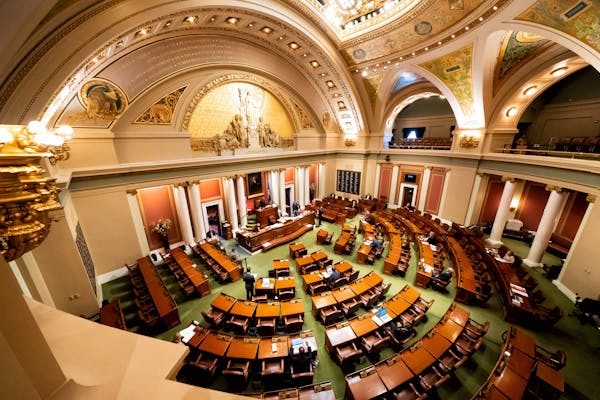Being transgender is not something Leigh Finke is trying to hide. It's there the moment someone sees her — resplendent in pastel-hued hair — or when she opens her mouth to speak.
The fear of other people's reactions have kept many in the trans community hidden away, she said. In her campaign for the Minnesota Legislature, Finke's goal is to be as visible as possible.
"I think of it as elbow room: We've got to make more elbow room," Finke said. "The more of us there are, the more space we take up for the next round of people who are going to come in."
The St. Paul filmmaker, 41, made history Tuesday night, becoming the first transgender candidate to win a major party primary election in Minnesota. Given the strong DFL lean of her St. Paul area House seat, Finke is also poised to become the first transgender legislator in state history when the 2023 session convenes in January.
"I don't know what to expect when I get there, but I know it should be a place that we are welcome," Finke said. "Hopefully it will be a little bit more so because I and other LGBTQ candidates get there."
She's part of a group of 11 LGBTQ candidates running for seats in the Minnesota Legislature this fall, including several others who prevailed in contested primaries Tuesday night. Erin Maye Quade, who went into labor during the DFL convention and lost the endorsement, defeated her opponent Justin Emmerich by nearly 30 percentage points for an Apple Valley Senate seat. Alicia Kozlowski beat a DFL primary challenger for a Duluth House seat by more than 20 percentage points.
It's believed to be a record number of LGBTQ candidates running for the Minnesota Legislature, where only four openly gay members are currently serving. Sean Meloy, vice president of political programs for the national LGBTQ Victory Fund, said candidates and voters are motivated this cycle in part because of anti-transgender bills introduced in state legislatures across the country and fears that the U.S. Supreme Court could relitigate the issue of gay marriage.
"Hearing from our candidates, they are seeing an uptick in people who are engaging, either donating or volunteering their time, or coming out to vote," he said. "It's because of this titanic shift in what we thought was settled law, and the forecast that they're going to come for our privacy even more."
A 2021 bill introduced in Minnesota that would make it a petty misdemeanor for transgender girls to participate on girls sports teams prompted Finke to make the move from activist to candidate.
She first got involved in politics as a student at Bethel University in St. Paul protesting the Iraq War. Years later, the fatal shooting of Trayvon Martin in 2012 reignited her activism. She also started the process of transitioning a few years later, which changed her perspectives on "basically everything I had done and would do in the future."
The redistricting process this year created an opening: Longtime DFL Rep. Alice Hausman, who represented her Falcon Heights, Roseville and St. Paul area district for more than 30 years, announced she was retiring and the newly drawn seat was open. Finke jumped into the race late and managed to block an endorsement in the contest. On Tuesday, she prevailed over teacher Dave Thomas in the primary by nearly 30 percentage points.
"This is a pretty Democratic district, so, in a lot of ways this was the question-mark night," Finke said of Tuesday's primary. She's mapping out her plan until the November election, but she's also thinking ahead to next session in January.
As a parent of children in elementary school, she wants to advocate for more mental health funding in schools and expanded abortion rights, and work on committees that tackle clean energy and climate change.
But she also expects to be a voice for transgender Minnesotans, pushing for more access to transitional health care services while also fighting legislation that could limit transgender rights in the state.
She's nervous about how she'll be treated at the Capitol, especially in a national political environment where she said "disrespect is the norm." But she's heard from other DFL legislators about strong bonds they've formed at the Capitol with colleagues from the other side of the aisle.
Just by being there, Finke hopes she can change some people's misconceptions about trans people.
"I know that terrible things have been said by people that I'm going to work with. We also know — based on research — that the most effective way to change someone's attitudes toward trans people is for them to meet a trans person," she said. "Just being in that room is going to be so important."
Former DFL Senate Majority Leader Kari Dziedzic dies of cancer at age 62

How the Star Tribune is covering the 2024 election

Fact check: Walz and Vance made questionable claims during only VP debate

In Tim Walz's home city, opposing groups watch him debate on the national stage

